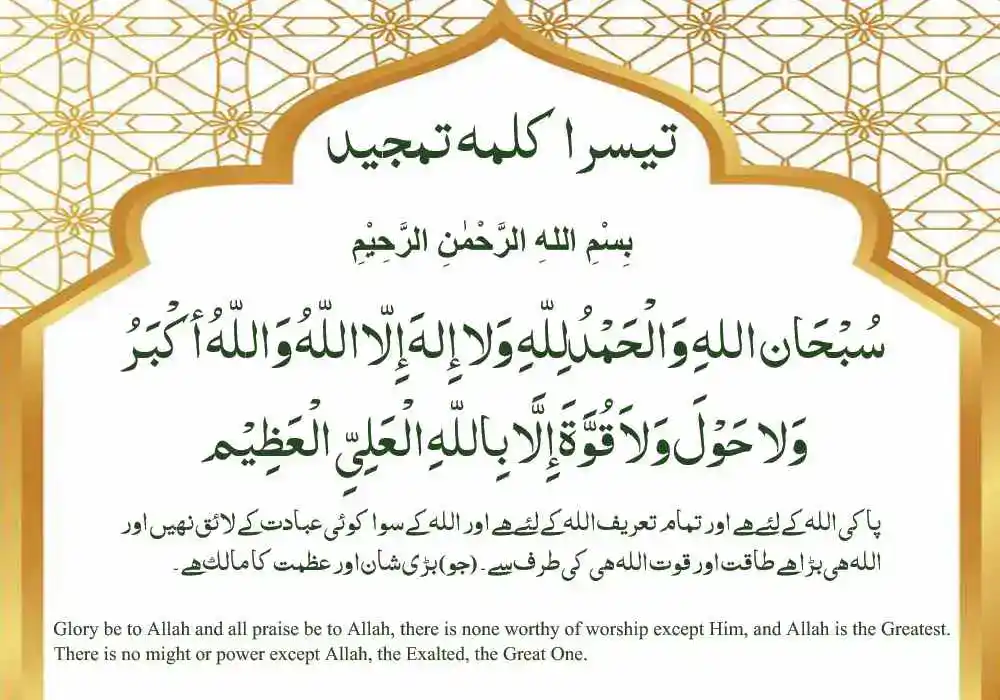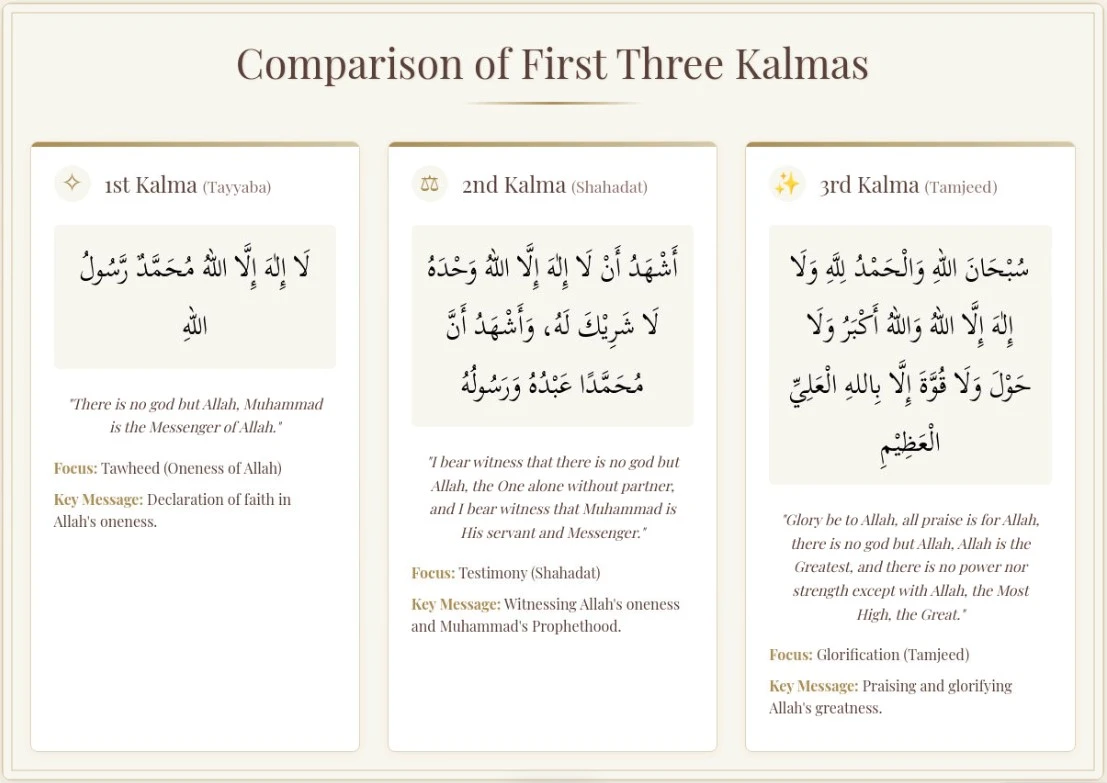3rd Kalma Tamjeed PDF and Audio Recitation with Translation
The 3rd Kalma, also known as Kalma Tamjeed (the Word of Glorification), holds a special place in the hearts of Muslims worldwide. It is one of the Six Kalmas in Islam, which are powerful declarations of faith and core aspects of Islamic belief. The 3rd Kalma glorifies Allah’s greatness, acknowledges His supremacy, and reinforces the concept of Tawheed (oneness of Allah).
Reciting the 3rd Kalma regularly brings spiritual peace, strengthens faith, and serves as a powerful reminder of Allah’s greatness and mercy. In this article, we will explore the meaning, importance, and spiritual benefits of the 3rd Kalma Tamjeed PDF, along with its significance in Islamic teachings.
Kalma Tamjeed (3rd Kalma) in Arabic Text
سُبْحَان اللهِ وَالْحَمْدُلِلّهِ وَلا إِلهَ إِلّااللّهُ وَاللّهُ أكْبَرُ وَلا حَوْلَ وَلاَ قُوَّةَ إِلَّا بِاللّهِ الْعَلِيِّ الْعَظِيْم
3rd Kalma Tamjeed PDF Download
3rd Kalma (Teesra Kalma) Tamjeed in English Translation
“Glory be to Allah, and all praise is due to Allah, and there is none worthy of worship except Allah, and Allah is the Greatest. There is no power and no strength except with Allah, the Most High, and the Most Great.”
Listen 3rd Kalma Tamjeed Recitation Online Audio

Meaning and Explanation of the 3rd Kalma Tamjeed PDF
The 3rd Kalma is a beautiful combination of glorification (Subhan Allah), praise (Alhamdulillah), affirmation of Allah’s oneness (La ilaha illa Allah), and recognition of Allah’s supreme power (Allahu Akbar). It concludes with an expression of dependence on Allah (La hawla wa la quwwata illa billah).
Subhan Allah (سُبْحَان اللهِ) Glory be to Allah
1- This phrase declares the perfection of Allah.
2- It means that Allah is free from any defects or imperfections.
3- Reciting “Subhan Allah” acknowledges Allah’s absolute purity and greatness.
Alhamdulillah (وَالْحَمْدُلِلّهِ), All praise is due to Allah
1- This phrase expresses gratitude for Allah’s blessings.
2- Muslims are encouraged to say “Alhamdulillah” in all situations, whether good or bad, as a sign of complete trust in Allah’s wisdom.
La ilaha illa Allah (وَلا إِلهَ إِلّااللّهُ) There is no deity except Allah
1- This affirms the oneness of Allah (Tawheed).
2- It is the core statement of faith in Islam.
3- Reciting it reminds believers that Allah alone deserves worship.
Allahu Akbar (وَاللّهُ أكْبَرُ) Allah is the Greatest
1- This phrase emphasizes Allah’s supreme power and authority.
2- It serves as a reminder that no matter how difficult life gets, Allah’s power is greater than any challenge.
La hawla wa la quwwata illa billah (وَلا حَوْلَ وَلاَ قُوَّةَ إِلَّا بِاللّهِ) There is no power and no strength except with Allah
1- This teaches that true strength and ability come from Allah.
2- It helps Muslims to rely completely on Allah’s guidance and support.
Al Aliyyil Azeem (الْعَلِيِّ الْعَظِيْم) Allah’s unmatched superiority and power
1- Refers to Allah’s absolute supremacy in rank, status, and authority above all creation. He is transcendent, beyond any limitations of time, space, or human understanding.
2- Emphasizes Allah’s boundless greatness, majesty, and perfection. His power, knowledge, and grandeur are beyond human comprehension.
Importance of the 3rd Kalma Tamjeed PDF
The 3rd Kalma is not just a verbal declaration, it reflects the foundation of Islamic belief. Its importance lies in several key aspects:
Glorification of Allah
Reciting “Subhan Allah” (سُبْحَان اللهِ) affirms Allah’s perfection and acknowledges His supreme greatness. This strengthens the spiritual connection between the believer and Allah.
Expression of Gratitude
Saying “Alhamdulillah” (الْحَمْدُلِلّهِ) encourages Muslims to stay grateful for Allah’s blessings and trust His divine plan. Gratitude is a key element of faith.
Affirmation of Tawheed
“La ilaha illa Allah” (لا إِلهَ إِلّااللّهُ) is the essence of Islamic faith. It reinforces the concept that Allah alone deserves worship and no other being holds divine power.
Seeking Strength from Allah
Reciting “La hawla wa la quwwata illa billah,” (لا حَوْلَ وَلاَ قُوَّةَ إِلَّا بِاللّهِ) Muslims acknowledge that true strength lies with Allah. It builds trust and dependence on Allah’s guidance.
Seek strength through His greatness.
When you say “Al-Aliyyil-Azeem” (الْعَلِيِّ الْعَظِيمِ), you are invoking two of Allah’s majestic names Al-Aliyy (The Most High) and Al-Azeem (The Most Great). This act carries profound spiritual, theological, and emotional significance.
Spiritual and Psychological Benefits of Reciting the 3rd Kalma
Reciting the 3rd Kalma regularly has powerful spiritual and psychological benefits:
Hadith and Prophetic Teachings on the 3rd Kalma
The importance of glorifying and praising Allah is deeply rooted in the teachings of Prophet Muhammad (صلى الله عليه وسلم).
Hadith on the Power of Glorification
“The most beloved words to Allah are four: Subhan Allah, Alhamdulillah, La ilaha illa Allah, and Allahu Akbar.” (Sahih Muslim)
Hadith on Seeking Allah’s Strength
“There is no might nor power except with Allah.” (Bukhari and Muslim)
How to Incorporate the 3rd Kalma in Daily Life
Muslims can benefit from the 3rd Kalma by incorporating it into their daily routine:
Why the 3rd Kalma is Powerful
The 3rd Kalma combines the key elements of Islamic faith, glorification, gratitude, affirmation of Tawheed, and dependence on Allah’s strength. Its recitation covers all aspects of a Muslim’s relationship with Allah, making it a powerful and comprehensive act of worship.
Comparison of First Three Kalmas

Summary
The 3rd Kalma is a profound declaration of faith, glorification, and reliance on Allah’s strength. It reinforces the core principles of Islam and serves as a powerful tool for spiritual growth and protection. By regularly reciting the 3rd Kalma with understanding and sincerity, Muslims can strengthen their faith, attract Allah’s blessings, and find peace in their hearts. Let us make the 3rd Kalma a daily habit and experience its transformative power.
FAQ’s
The Six Kalimas Series
- ➡️ 1st Kalima Tayyab – Declaration of Faith
- ➡️ 2nd Kalima Shahadat – Declaration of Testimony
- ➡️ 3rd Kalima Tamjeed (You’re here) – Declaration of Glory
- ➡️ 4th Kalima Tauheed – Declaration of Unity
- ➡️ 5th Kalma Istighfar – Declaration of Repentance
- ➡️ 6th Kalma Radd-e-Kufr – Rejection of Disbelief
📊 Your Progress: You’ve completed 3/6 Kalimas!

